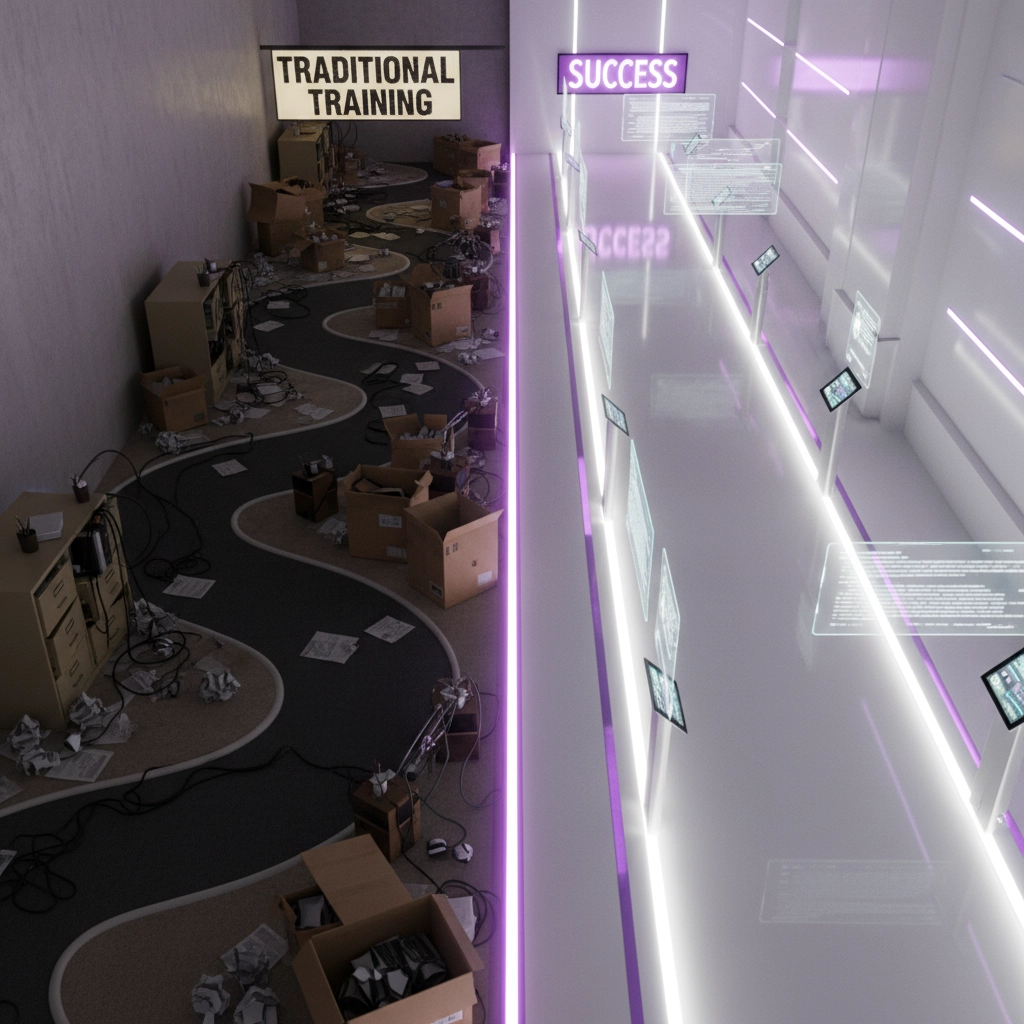The numbers tell the story. Traditional real estate agent onboarding produces a 40% first-year dropout rate. Modern systematic onboarding achieves 85% retention with agents closing deals in 30-60 days instead of 6-12 months.
Most brokerages still treat real estate agent onboarding as a compliance exercise. This approach fails agents and costs brokerages millions in lost revenue.
Traditional Training: The Outdated Method
Traditional real estate agent onboarding follows a predictable pattern. New agents spend weeks in classrooms learning forms, policies, and procedures. Training is generic. Everyone gets the same content regardless of experience level.
The process prioritizes compliance over performance. Agents memorize contract details before learning lead generation. They study brokerage rules before understanding market analysis. Access to leads comes later, sometimes months later.
Mentorship exists but operates informally. Some agents get paired with experienced mentors. Others receive minimal guidance. The quality varies dramatically between offices.
Traditional Onboarding Timeline:
- Weeks 1-2: Compliance and paperwork training
- Weeks 3-4: Systems overview and policy review
- Months 2-3: Gradual lead access and market training
- Months 4-6: First deal attempts
- Months 6-12: Productivity development
This timeline explains why 71% of real estate agents closed zero deals last year.

Modern Real Estate Agent Onboarding: The Systematic Approach
Progressive brokerages have redesigned real estate agent onboarding as an acceleration program. The focus shifts from rules to revenue activities from day one.
Modern onboarding uses rapid immersion frameworks. New agents complete intensive 72-hour sprints covering technology setup, lead generation systems, and market fundamentals. This approach reduces onboarding downtime by 50%.
Technology integration happens immediately. CRM setup, transaction management, and communication tools become operational within the first week. Agents start prospecting while learning compliance requirements.
Gamification elements increase engagement. Brokerages like Keller Williams and Compass use game-based training systems. Agents earn points for completing modules, closing deals, and team participation. This method improves retention rates and accelerates skill development.
Modern Onboarding Timeline:
- Days 1-3: Technology immersion and lead system activation
- Week 1: Active prospecting begins with compliance training
- Weeks 2-4: First deal pipeline development
- Months 1-2: Deal closure and performance optimization
- Month 3: Sustained productivity achievement
Head-to-Head Performance Comparison
| Metric | Traditional Training | Modern Onboarding |
|---|---|---|
| Time to First Deal | 6-12 months | 30-60 days |
| Time to Productivity | 6-12 months | 90 days |
| First-Year Retention | 60% | 85%+ |
| Training Focus | Compliance-first | Revenue-first |
| Lead Access | Delayed months | Immediate |
| Mentorship | Informal, inconsistent | Structured coaching |
| Technology Setup | Gradual rollout | 72-hour immersion |
The data demonstrates clear superiority of modern real estate agent onboarding methods.

Why Traditional Methods Fail
Traditional real estate agent onboarding creates a “valley of death” period. New agents receive extensive theoretical training but lack practical skills for immediate success. This gap between knowledge and application causes confidence issues and financial stress.
Information overload compounds the problem. Agents learn dozens of forms before understanding market dynamics. They memorize policy details before developing prospecting skills. This sequence prioritizes low-value activities over revenue generation.
Generic training ignores individual experience levels. Career changers with sales backgrounds receive identical training to fresh graduates. This one-size-fits-all approach wastes time and reduces effectiveness.
Delayed lead access prevents early wins. New agents wait weeks or months before accessing quality leads. This delay eliminates momentum and reduces motivation during the critical early period.
The Psychology of Accelerated Success
Modern real estate agent onboarding addresses psychological factors that traditional methods ignore. Early wins build confidence. Immediate lead access creates momentum. Structured progression maintains motivation.
Gamification taps into competitive instincts. Agents compete for recognition while learning essential skills. This approach makes training engaging rather than tedious.
Peer connections develop faster through intensive group experiences. Agents build relationships during concentrated training periods. These connections provide ongoing support and accountability.
How Pulse Intelligence Enhances Modern Onboarding
Real estate agent onboarding becomes more effective with intelligent systems that adapt to individual performance patterns. Pulse Intelligence analyzes agent activity, identifies improvement opportunities, and provides personalized coaching recommendations.
The platform tracks key onboarding metrics including lead conversion rates, activity levels, and skill development progress. This data enables managers to intervene before problems escalate and recognize high performers early.
Automated coaching prompts guide new agents through critical early activities. The system reminds agents about follow-up tasks, suggests optimal contact timing, and provides conversation templates for common scenarios.

Implementation Strategy for Brokerages
Successful real estate agent onboarding transformation requires systematic planning. Start with technology infrastructure. Ensure CRM systems, lead management platforms, and training modules integrate seamlessly.
Design intensive orientation experiences. Concentrate essential training into focused time periods rather than spreading over months. This approach accelerates competency development and reduces time-to-productivity.
Establish clear progression milestones. Define specific goals for 30, 60, and 90-day periods. Track progress against these benchmarks and adjust support as needed.
Create structured mentorship programs. Pair new agents with proven performers using formal guidelines and expectations. Regular check-ins ensure consistent support quality.
Implement feedback loops. Gather data on onboarding effectiveness through agent surveys, performance metrics, and retention analysis. Use this information to continuously improve the process.
Measuring Onboarding Success
Effective real estate agent onboarding requires precise measurement. Track time-to-first-deal as a primary indicator. Monitor retention rates at 90-day, 6-month, and 12-month intervals.
Analyze revenue generation patterns. Successful onboarding produces consistent deal flow within the first quarter. Compare new agent productivity against established benchmarks.
Survey satisfaction levels throughout the onboarding process. Identify pain points and improvement opportunities before they impact retention.

Technology Requirements for Modern Onboarding
Real estate agent onboarding demands robust technology infrastructure. CRM systems must activate within 24 hours of agent hire. Lead distribution platforms need immediate integration capabilities.
Training platforms should support gamification features and progress tracking. Mobile accessibility ensures agents can continue learning outside office environments.
Analytics capabilities enable performance monitoring and predictive insights. These tools identify at-risk agents before problems become terminal.
Communication systems must support structured mentor-agent interactions and group collaboration during intensive training periods.
The Financial Impact
Traditional real estate agent onboarding costs brokerages significant revenue through extended ramp periods and high turnover rates. A single agent departure within the first year represents $50,000-$100,000 in lost investment and opportunity costs.
Modern onboarding approaches require higher upfront investment but generate superior returns. Faster time-to-productivity and improved retention rates create positive ROI within the first quarter.
Calculate the impact: If traditional onboarding produces 60% retention with 6-month productivity timelines, and modern methods achieve 85% retention with 90-day productivity, the revenue difference becomes substantial across agent cohorts.
Results Speak Louder Than Methods
The evidence supporting modern real estate agent onboarding is conclusive. Brokerages implementing systematic approaches consistently outperform traditional training models across all key metrics.
Agents deserve onboarding experiences that set them up for immediate success rather than prolonged struggle. The tools and methodologies exist to eliminate the industry’s traditional “valley of death” period.
Ready to transform your real estate agent onboarding process? Discover how leading brokerages use data-driven insights to accelerate agent success and improve retention rates. Start your transformation today.





